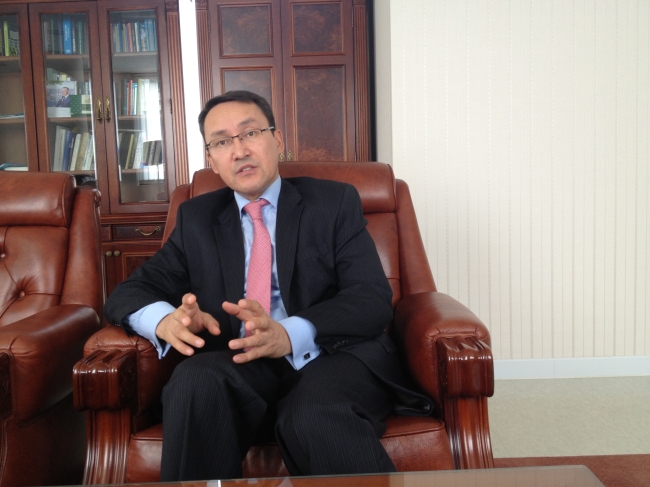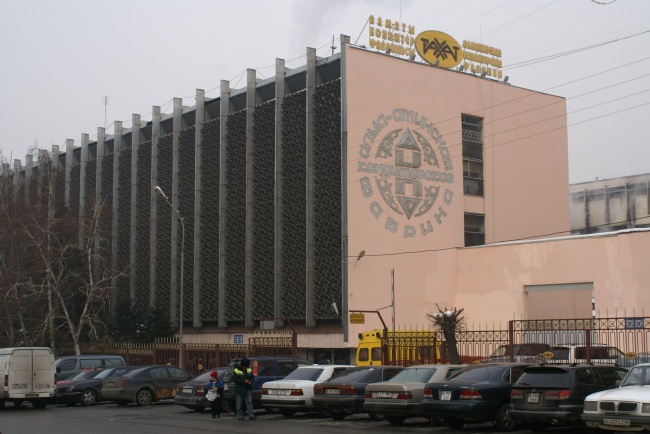While Russia’s relationships with the United States and Europe are frayed over the conflict in Ukraine, the newly minted Eurasian Economic Union ― made official during a signing ceremony in Astana, Kazakhstan, on May 29 ― will surely tighten Russia’s ties with former Soviet republics.
But that aspect of the newly minted EEU belies the pact’s real winner, Kazakhstan, how the pact could boost economic growth in the Central Asian nation and, by extension, the benefit to foreign investors, including South Korean companies with facilities in Kazakhstan worth billions of dollars.
“First of all, (the EEU) provides access to a common market of over 170 million people. Second, after signing the agreement, our expectation is that by 2030 the economy of the member states will expand by an additional 25 percent,” Kazakh Ambassador to South Korea Dulat Bakishev said.
Bakishev said he expects the pact’s boost to growth to be worth $600 billion in the next 15 years and said the EEU will develop into an open economic community. “Kazakhstan will remain a reliable bridge between Europe and a growing Asia.”
The union was reportedly seen by many experts as more of a triumph for Kazakhstan than for Russia.
“Our government wants to expand relations with continental countries, and many Korean companies already anticipated a Eurasian formation,” said Hanyang University professor Eeom Gu-ho. “The EEU will surely benefit the member states and Korea in the long term.”

Kazakh Ambassador to South Korea Dulat Bakishev
Eeom, who heads Hanyang University’s Asia-Pacific Research Center, said that although the Ukraine crisis likely makes South Korea approach the union more cautiously, in the long term Asia’s fourth-largest economy must form constructive relationships with Russia and Central Asian nations.
After nearly two decades in the making, the main stumbling block for Kazakhstan had been concerns over sovereignty that have heightened by Moscow’s actions in Ukraine, which have helped critics of the pact frame the EEU as a backdoor bid by a resurgent Russia to recreate the Soviet Union.
Bakishev sought to allay those concerns. “This union does not have any ‘super national’ authority over the head of state and over Kazakhstan in particular,” he said. “We will continue working on expanding our cooperation with other states. Our accession to the EEU will not affect bilateral relations with other countries or multilateral agreements signed by Kazakhstan.” Kazakhstan attracted about $100 billion in investment from 2009-2012, with its top investor being the European Union.

Lotte Group in November 2013 acquired leading candy maker Rakhat Confectionery, pictured in this undated photo, in Almaty, Kazakhstan. (Lotte Group)
While the deal has some critics in Kazakhstan, it was widely supported by the business community there which sees increased foreign investment as a result of the EEU boosting development projects in the landlocked country.
President Park Geun-hye is looking to Kazakhstan as an important partner in her ambitious “Eurasian Initiative,” which seeks to connect transportation, electrical, gas and oil links from Western Europe to East Asia. That initiative echoes China’s long-standing “New Silk Road Project.”
Lower export costs among Kazakhstan, Belarusia and Russia fit into these two plans. It also helps South Korean companies seeking to ship to Russia from Kazakhstan.
A case in point is Lotte Group’s move into the region over the past five years. Lotte’s confectionery arm set up a Choco Pie factory in Obninsk, Russia, in September 2010. It also bought Kazakhstan’s signature candy maker, Rakhat, for $157 million, giving it a strong foothold in Central Asia and Russia.
“It seems too early to judge the effect of EEU now, but one could say that if the EEU increases the number of member states, then Rakhat can expand exports to Eurasian countries on the basis of the customs-free privileges enjoyed among the group’s members.
Based in Central Asia, Rakhat makes robust exports to Russia now,” said an official for Lotte Group. Rakhat makes the signature chocolate bar “Kazakhstan,” and already has an estimated 20 percent share of the Kazakh confectionery market.
Park is widely rumored to make a state visit to Kazakhstan this month, although the government has yet to announce a travel schedule.
Plans for a presidential visit were also discussed on the sidelines of the eighth Korea-Central Asia Cooperation Forum in Seoul in April, when a Kazakh delegation headed by Deputy Foreign Minister Yerzhan Ashikbayev arrived in South Korea to participate. Park also met with Kazakh President Nursultan Nazarbayev on the sidelines of the G20 Summit in St. Petersburg, Russia, in September 2013, when they discussed a South Korean state visit.
It would be Park’s first to the Central Asian nation. Her predecessor Lee Myung-bak visited Kazakhstan three times during his term in office.
South Korea has already poured more than $4 billion into mega projects, and the two countries have inked agreements totaling more than $10 billion.
The bulk of this investment centers on three large-scale projects: the construction of the Balkhash Thermal Power Plant in central Kazakhstan, a chemical plant near Atyrau city in western Kazakhstan, and the Zhambyl oil and gas field in western Kazakhstan. Valued at $4 billion each, two of them were inked in September 2012.
The presidents of Armenia and Kyrgyzstan attended the Astana signing ceremony. Yerevan’s accession bid should be finalized by July 1 and Bishkek could finalize its bid by the end of the year.
The economic grouping already has a combined GDP of $2.6 trillion. The group is expected to expand to five member states when it goes into effect on Jan. 1, 2015, beyond its current three members. Lotte Group has been investing in Russia for years. It launched the first Korean-style department store overseas by opening a Lotte Department Store in Moscow in 2007.
Eurasia is fast becoming a strategic region, a sentiment underscored by the Kazakh envoy with a simple declarative: “So, Korean companies in Kazakhstan will be able to use the potential of this much larger market,” Bakishev said.
By Philip Iglauer (ephilip2014@heraldcorp.com)







